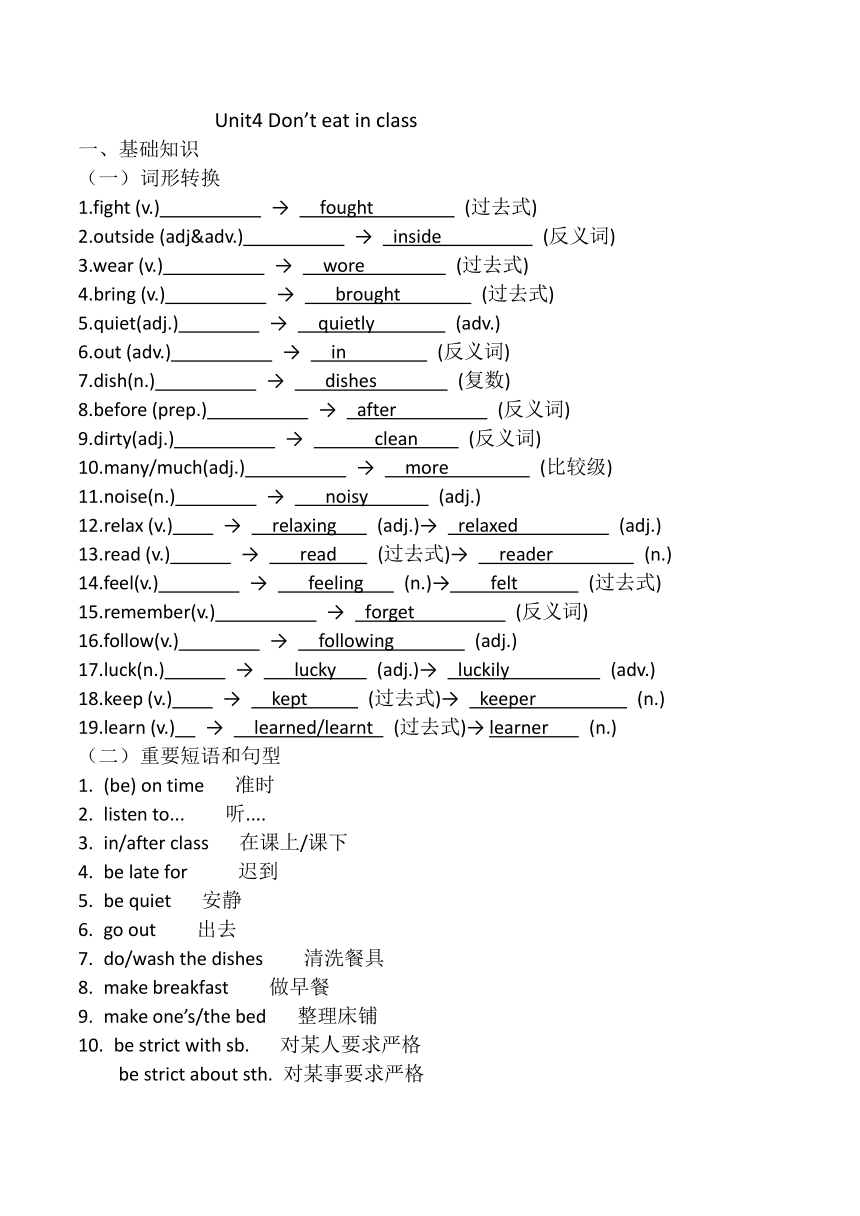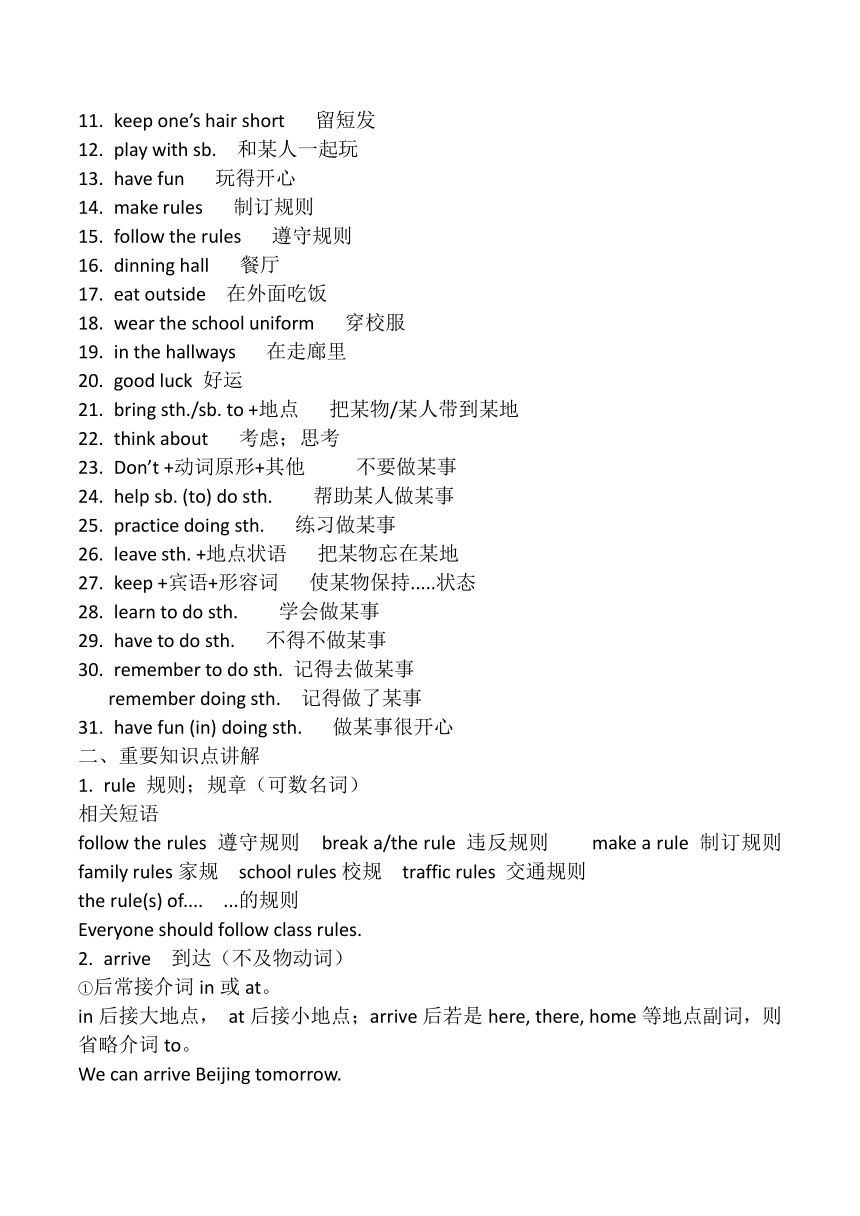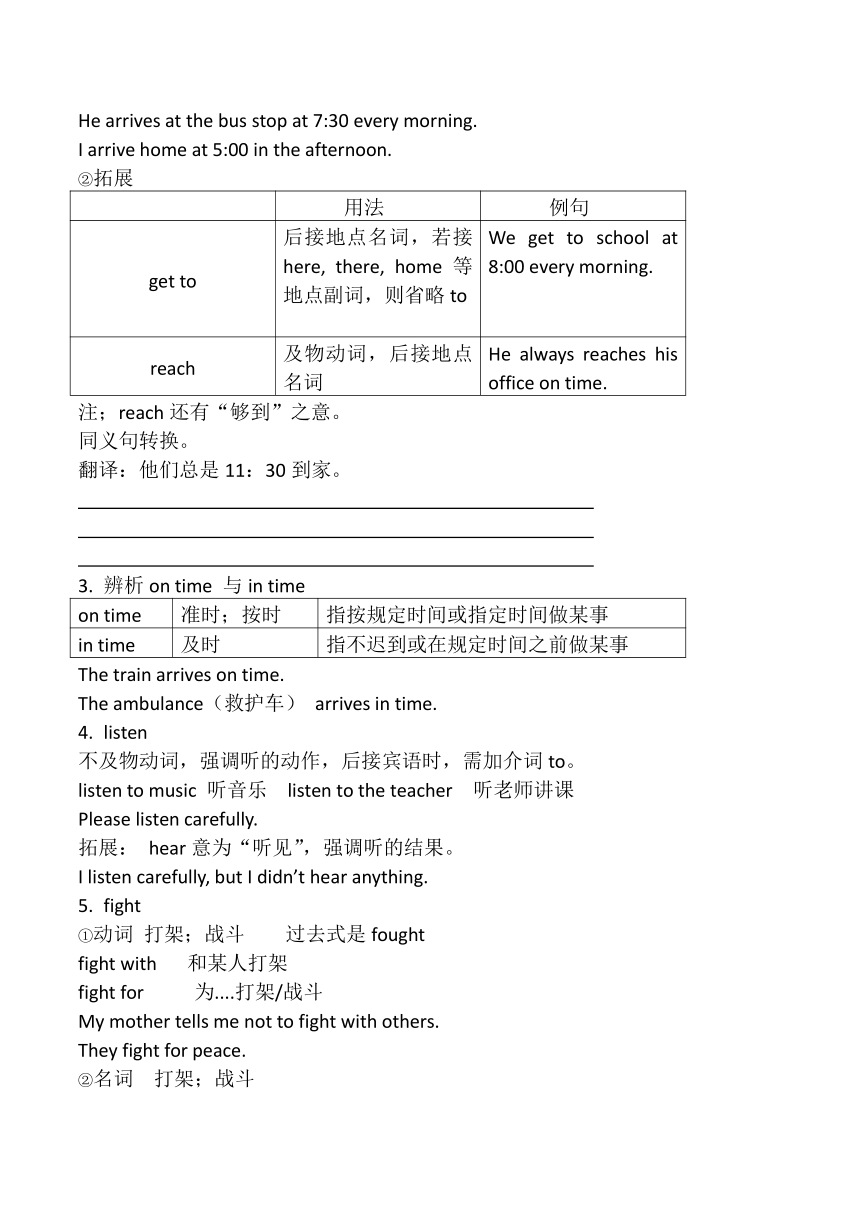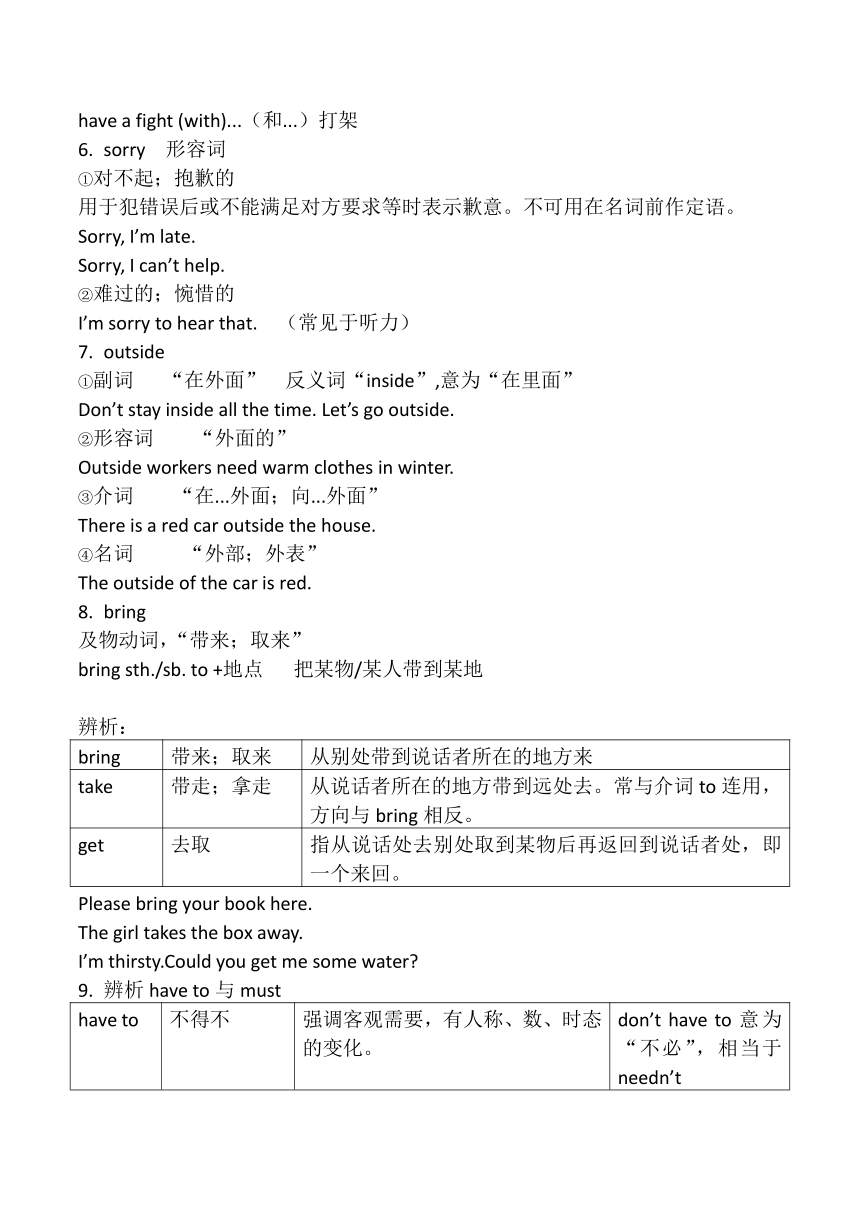Unit 4 Don't eat in class.基础知识总结
文档属性
| 名称 | Unit 4 Don't eat in class.基础知识总结 |

|
|
| 格式 | docx | ||
| 文件大小 | 30.2KB | ||
| 资源类型 | 教案 | ||
| 版本资源 | 人教新目标(Go for it)版 | ||
| 科目 | 英语 | ||
| 更新时间 | 2024-06-21 00:00:00 | ||
图片预览




文档简介
Unit4 Don’t eat in class
基础知识
词形转换
1.fight (v.) → fought (过去式)
2.outside (adj&adv.) → inside (反义词)
3.wear (v.) → wore (过去式)
4.bring (v.) → brought (过去式)
5.quiet(adj.) → quietly (adv.)
6.out (adv.) → in (反义词)
7.dish(n.) → dishes (复数)
8.before (prep.) → after (反义词)
9.dirty(adj.) → clean (反义词)
10.many/much(adj.) → more (比较级)
11.noise(n.) → noisy (adj.)
12.relax (v.) → relaxing (adj.)→ relaxed (adj.)
13.read (v.) → read (过去式)→ reader (n.)
14.feel(v.) → feeling (n.)→ felt (过去式)
15.remember(v.) → forget (反义词)
16.follow(v.) → following (adj.)
17.luck(n.) → lucky (adj.)→ luckily (adv.)
18.keep (v.) → kept (过去式)→ keeper (n.)
19.learn (v.) → learned/learnt (过去式)→ learner (n.)
重要短语和句型
(be) on time 准时
listen to... 听....
in/after class 在课上/课下
be late for 迟到
be quiet 安静
go out 出去
do/wash the dishes 清洗餐具
make breakfast 做早餐
make one’s/the bed 整理床铺
be strict with sb. 对某人要求严格
be strict about sth. 对某事要求严格
keep one’s hair short 留短发
play with sb. 和某人一起玩
have fun 玩得开心
make rules 制订规则
follow the rules 遵守规则
dinning hall 餐厅
eat outside 在外面吃饭
wear the school uniform 穿校服
in the hallways 在走廊里
good luck 好运
bring sth./sb. to +地点 把某物/某人带到某地
think about 考虑;思考
Don’t +动词原形+其他 不要做某事
help sb. (to) do sth. 帮助某人做某事
practice doing sth. 练习做某事
leave sth. +地点状语 把某物忘在某地
keep +宾语+形容词 使某物保持.....状态
learn to do sth. 学会做某事
have to do sth. 不得不做某事
remember to do sth. 记得去做某事
remember doing sth. 记得做了某事
have fun (in) doing sth. 做某事很开心
重要知识点讲解
rule 规则;规章(可数名词)
相关短语
follow the rules 遵守规则 break a/the rule 违反规则 make a rule 制订规则 family rules家规 school rules校规 traffic rules 交通规则
the rule(s) of.... ...的规则
Everyone should follow class rules.
arrive 到达(不及物动词)
①后常接介词in或at。
in后接大地点, at后接小地点;arrive后若是here, there, home等地点副词,则省略介词to。
We can arrive Beijing tomorrow.
He arrives at the bus stop at 7:30 every morning.
I arrive home at 5:00 in the afternoon.
②拓展
用法 例句
get to 后接地点名词,若接here, there, home等地点副词,则省略to We get to school at 8:00 every morning.
reach 及物动词,后接地点名词 He always reaches his office on time.
注;reach还有“够到”之意。
同义句转换。
翻译:他们总是11:30到家。
辨析on time 与in time
on time 准时;按时 指按规定时间或指定时间做某事
in time 及时 指不迟到或在规定时间之前做某事
The train arrives on time.
The ambulance(救护车) arrives in time.
listen
不及物动词,强调听的动作,后接宾语时,需加介词to。
listen to music 听音乐 listen to the teacher 听老师讲课
Please listen carefully.
拓展: hear意为“听见”,强调听的结果。
I listen carefully, but I didn’t hear anything.
fight
①动词 打架;战斗 过去式是fought
fight with 和某人打架
fight for 为....打架/战斗
My mother tells me not to fight with others.
They fight for peace.
②名词 打架;战斗
have a fight (with)...(和...)打架
sorry 形容词
①对不起;抱歉的
用于犯错误后或不能满足对方要求等时表示歉意。不可用在名词前作定语。
Sorry, I’m late.
Sorry, I can’t help.
②难过的;惋惜的
I’m sorry to hear that. (常见于听力)
outside
①副词 “在外面” 反义词“inside”,意为“在里面”
Don’t stay inside all the time. Let’s go outside.
②形容词 “外面的”
Outside workers need warm clothes in winter.
③介词 “在...外面;向...外面”
There is a red car outside the house.
④名词 “外部;外表”
The outside of the car is red.
bring
及物动词,“带来;取来”
bring sth./sb. to +地点 把某物/某人带到某地
辨析:
bring 带来;取来 从别处带到说话者所在的地方来
take 带走;拿走 从说话者所在的地方带到远处去。常与介词to连用,方向与bring相反。
get 去取 指从说话处去别处取到某物后再返回到说话者处,即一个来回。
Please bring your book here.
The girl takes the box away.
I’m thirsty.Could you get me some water
辨析have to与must
have to 不得不 强调客观需要,有人称、数、时态的变化。 don’t have to意为“不必”,相当于needn’t
must 必须;一定 强调说话人的主观看法,语气比较强烈。 mustn’t表示“禁止”
Molly leave because she doesn’t feel well.
I finish the work today.
quiet
形容词,“安静的”,在句中作定语或表语。其反义词是noisy,意为“吵闹的”;其副词形式是quietly,意为“安静地”。
The old man lives in a quiet place.
Don’t be noisy. You must be quiet.
I close the door quietly.
be quiet =keep quiet 保持安静
practice
①及物动词 “练习;训练”
后可跟名词、代词或动词ing形式作宾语。
practice doing sth. 练习做某事
I often practice my English in the morning.
I often practice speaking English with my classmates.
②不可数名词 “练习;实践”
Playing the piano needs a lot of practice.
Practice makes everything.
help
help sb. (to) do sth. 帮助某人做某事
He often helps his mother (to) do some housework.
拓展:
①help sb. with sth. 在某方面帮助某人 with后跟名词或代词。
I often helps her with her English.
②help oneself to... 请随便吃/喝
Please help yourself to some juice.
③不可数名词 帮助
Thanks for your help.
before
①介词 “在...以前”,表示时间, 反义词“after”,意为“在...之后”
He usually does his homework before dinner, and watches TV after dinner.
②介词 “在...的前面”,表示位置关系,反义词是behind,意为“在...后面”
Tom sits before me, and I sit behind him.
③连词 “在...以前”,引导时间状语从句。
Tom must brush his teeth before he goes to bed.
④副词 “以前”
I never met him before.
辨析too many, too much 与much too
too many 太多 后接可数名词复数形式
too much 太多 后接不可数名词,还可修饰动词作状语
much too 太 much用来加强语气,too后面常接形容词或副词
There are too many flowers in the garden.
I have too much homework today.
Don’t watch TV too much.
It is much too hot today.
make 相关短语
make one’s/the bed铺床
make dumplings 包饺子 make a noise 制造噪音make friends交朋友
make rules 制订规则 make money 赚钱 make a living 谋生
make a phone call to sb.给某人打电话
leave 动词
①留下;剩下 过去式是left
leave +宾语+地点状语 把...留在某地
leave sb. by oneself 把某人独自留下
Don’t leave young children at home.
②忘了带;落下
leave sth.+地点状语 把某物忘在某处
I sometimes leave the keys at home.
relax
动词 “放松” 单三形式是relaxes
形容词形式有两种:
relaxing “令人放松的”,主语一般是物。
relaxed “放松的”,主语一般是人。
The film is very relaxing.
He is relaxed after listening
read 读 强调看书、报纸、杂志等。
look 看 强调“看”的动作,后接宾语时,与at连用
see 看见 强调看的结果,表示“看见”
watch 观看 强调“观看”正在运动或变化的事物,常含有“欣赏”之意。
辨析read, look, see与watch.
I like reading newspapers.
Look at the blackboard, please.
I can see many clouds in the sky.
I sometimes watch TV in the evening.
辨析remember to do sth.与remember doing sth.
remember to do sth. 记得要做某事 事情还没有做
remember doing sth. 记得做过某事 事情已经做过
Remember to close the door when you leave.
I remember seeing her in the city.
keep
及物动词
①保持
keep+宾语+宾语补足语 “使...保持某种状态”
(充当宾语补足语的可以是形容词、副词、动词-ing形式或介词短语)
We must keep the classroom clean.
②保存 后可接时间段
You can keep the book for two weeks.
③遵守 与follow同义
Everyone must keep the rules.
连系动词 保持 后接形容词作表语。
We should eat vegetables and fruit to keep healthy.
learn
learn to do sth. 学习/学会做某事
相关短语:
learn from 向...学习
learn ... by oneself 自学...
learn about 了解
learn how to do sth. 学习如何做某事
have fun 玩得开心;过得愉快
Have fun (in) doing sth. 做某事很开心
We have fun learning English.
同义短语:
have a good time, enjoy oneself
重要语法讲解
祈使句
用于表达命令、请求、劝告、警告、禁止等的句子叫祈使句。
祈使句最常用于表达命令,因其对象(主语)是第二人称,所以通常省略主语,以动词原形开头,句末使用句号或感叹号。为表示礼貌,可在句首或句末加上please。Please放在句末时,前面通常加逗号。
Go and wash your hands.
Be quiet, please.
Be kind to your sisters.
Watch your steps!
Keep off the grass.
肯定式
Do型 动词原形(+宾语)+其他成分
Be型 Be+表语(名词/形容词)+其他成分
Let型 Let+宾语+动词原形+其他成分
Please sit down.
Be quiet.
Let me help you.
否定式
Do型 Don’t+动词原形+(其他)
Be型 Don’t+动词原形+(其他)
Let型 Let+宾语+not+动词原形+(其他) 或Don’t let +宾语+动词原形+(其他)
No型 No+名词/动名词
Don’t run in the classroom.
Don’t be late next time.
Don’t let him go./ Let him not go.
No photos.
No smoking.
情态动词 have to与must
have to表示客观需要做的事情,意思是“不得不”。
①后接动词原形。
You have to do your homework first.
②有人称、数和人称的变化,其单三形式是has to。
She has to look after her sick mother.
③含有have to, has to 的句子需要借助助动词do, does构成疑问句或否定句。
Do they have to go home now
must表示主观的义务和必要,主要用于肯定句和疑问句中,意思是“必须”。
①后接动词原形。
You must listen to the teacher carefully in class.
②由must开头的疑问句,肯定回答一般用must,否定回答一般用needn’t或don’t/doesn’t have to, 意为“不必”。
—Must I hand in my homework today
—Yes, you must. / No, you needn’t. / No, you don’t have to.
③must的否定形式是mustn’t,表示禁止,意为“不能,不许”。
You mustn’t swim here, it’s dangerous.
④表示肯定的推测,常用于肯定句,意为“一定”。
You must be very tired.
基础知识
词形转换
1.fight (v.) → fought (过去式)
2.outside (adj&adv.) → inside (反义词)
3.wear (v.) → wore (过去式)
4.bring (v.) → brought (过去式)
5.quiet(adj.) → quietly (adv.)
6.out (adv.) → in (反义词)
7.dish(n.) → dishes (复数)
8.before (prep.) → after (反义词)
9.dirty(adj.) → clean (反义词)
10.many/much(adj.) → more (比较级)
11.noise(n.) → noisy (adj.)
12.relax (v.) → relaxing (adj.)→ relaxed (adj.)
13.read (v.) → read (过去式)→ reader (n.)
14.feel(v.) → feeling (n.)→ felt (过去式)
15.remember(v.) → forget (反义词)
16.follow(v.) → following (adj.)
17.luck(n.) → lucky (adj.)→ luckily (adv.)
18.keep (v.) → kept (过去式)→ keeper (n.)
19.learn (v.) → learned/learnt (过去式)→ learner (n.)
重要短语和句型
(be) on time 准时
listen to... 听....
in/after class 在课上/课下
be late for 迟到
be quiet 安静
go out 出去
do/wash the dishes 清洗餐具
make breakfast 做早餐
make one’s/the bed 整理床铺
be strict with sb. 对某人要求严格
be strict about sth. 对某事要求严格
keep one’s hair short 留短发
play with sb. 和某人一起玩
have fun 玩得开心
make rules 制订规则
follow the rules 遵守规则
dinning hall 餐厅
eat outside 在外面吃饭
wear the school uniform 穿校服
in the hallways 在走廊里
good luck 好运
bring sth./sb. to +地点 把某物/某人带到某地
think about 考虑;思考
Don’t +动词原形+其他 不要做某事
help sb. (to) do sth. 帮助某人做某事
practice doing sth. 练习做某事
leave sth. +地点状语 把某物忘在某地
keep +宾语+形容词 使某物保持.....状态
learn to do sth. 学会做某事
have to do sth. 不得不做某事
remember to do sth. 记得去做某事
remember doing sth. 记得做了某事
have fun (in) doing sth. 做某事很开心
重要知识点讲解
rule 规则;规章(可数名词)
相关短语
follow the rules 遵守规则 break a/the rule 违反规则 make a rule 制订规则 family rules家规 school rules校规 traffic rules 交通规则
the rule(s) of.... ...的规则
Everyone should follow class rules.
arrive 到达(不及物动词)
①后常接介词in或at。
in后接大地点, at后接小地点;arrive后若是here, there, home等地点副词,则省略介词to。
We can arrive Beijing tomorrow.
He arrives at the bus stop at 7:30 every morning.
I arrive home at 5:00 in the afternoon.
②拓展
用法 例句
get to 后接地点名词,若接here, there, home等地点副词,则省略to We get to school at 8:00 every morning.
reach 及物动词,后接地点名词 He always reaches his office on time.
注;reach还有“够到”之意。
同义句转换。
翻译:他们总是11:30到家。
辨析on time 与in time
on time 准时;按时 指按规定时间或指定时间做某事
in time 及时 指不迟到或在规定时间之前做某事
The train arrives on time.
The ambulance(救护车) arrives in time.
listen
不及物动词,强调听的动作,后接宾语时,需加介词to。
listen to music 听音乐 listen to the teacher 听老师讲课
Please listen carefully.
拓展: hear意为“听见”,强调听的结果。
I listen carefully, but I didn’t hear anything.
fight
①动词 打架;战斗 过去式是fought
fight with 和某人打架
fight for 为....打架/战斗
My mother tells me not to fight with others.
They fight for peace.
②名词 打架;战斗
have a fight (with)...(和...)打架
sorry 形容词
①对不起;抱歉的
用于犯错误后或不能满足对方要求等时表示歉意。不可用在名词前作定语。
Sorry, I’m late.
Sorry, I can’t help.
②难过的;惋惜的
I’m sorry to hear that. (常见于听力)
outside
①副词 “在外面” 反义词“inside”,意为“在里面”
Don’t stay inside all the time. Let’s go outside.
②形容词 “外面的”
Outside workers need warm clothes in winter.
③介词 “在...外面;向...外面”
There is a red car outside the house.
④名词 “外部;外表”
The outside of the car is red.
bring
及物动词,“带来;取来”
bring sth./sb. to +地点 把某物/某人带到某地
辨析:
bring 带来;取来 从别处带到说话者所在的地方来
take 带走;拿走 从说话者所在的地方带到远处去。常与介词to连用,方向与bring相反。
get 去取 指从说话处去别处取到某物后再返回到说话者处,即一个来回。
Please bring your book here.
The girl takes the box away.
I’m thirsty.Could you get me some water
辨析have to与must
have to 不得不 强调客观需要,有人称、数、时态的变化。 don’t have to意为“不必”,相当于needn’t
must 必须;一定 强调说话人的主观看法,语气比较强烈。 mustn’t表示“禁止”
Molly leave because she doesn’t feel well.
I finish the work today.
quiet
形容词,“安静的”,在句中作定语或表语。其反义词是noisy,意为“吵闹的”;其副词形式是quietly,意为“安静地”。
The old man lives in a quiet place.
Don’t be noisy. You must be quiet.
I close the door quietly.
be quiet =keep quiet 保持安静
practice
①及物动词 “练习;训练”
后可跟名词、代词或动词ing形式作宾语。
practice doing sth. 练习做某事
I often practice my English in the morning.
I often practice speaking English with my classmates.
②不可数名词 “练习;实践”
Playing the piano needs a lot of practice.
Practice makes everything.
help
help sb. (to) do sth. 帮助某人做某事
He often helps his mother (to) do some housework.
拓展:
①help sb. with sth. 在某方面帮助某人 with后跟名词或代词。
I often helps her with her English.
②help oneself to... 请随便吃/喝
Please help yourself to some juice.
③不可数名词 帮助
Thanks for your help.
before
①介词 “在...以前”,表示时间, 反义词“after”,意为“在...之后”
He usually does his homework before dinner, and watches TV after dinner.
②介词 “在...的前面”,表示位置关系,反义词是behind,意为“在...后面”
Tom sits before me, and I sit behind him.
③连词 “在...以前”,引导时间状语从句。
Tom must brush his teeth before he goes to bed.
④副词 “以前”
I never met him before.
辨析too many, too much 与much too
too many 太多 后接可数名词复数形式
too much 太多 后接不可数名词,还可修饰动词作状语
much too 太 much用来加强语气,too后面常接形容词或副词
There are too many flowers in the garden.
I have too much homework today.
Don’t watch TV too much.
It is much too hot today.
make 相关短语
make one’s/the bed铺床
make dumplings 包饺子 make a noise 制造噪音make friends交朋友
make rules 制订规则 make money 赚钱 make a living 谋生
make a phone call to sb.给某人打电话
leave 动词
①留下;剩下 过去式是left
leave +宾语+地点状语 把...留在某地
leave sb. by oneself 把某人独自留下
Don’t leave young children at home.
②忘了带;落下
leave sth.+地点状语 把某物忘在某处
I sometimes leave the keys at home.
relax
动词 “放松” 单三形式是relaxes
形容词形式有两种:
relaxing “令人放松的”,主语一般是物。
relaxed “放松的”,主语一般是人。
The film is very relaxing.
He is relaxed after listening
read 读 强调看书、报纸、杂志等。
look 看 强调“看”的动作,后接宾语时,与at连用
see 看见 强调看的结果,表示“看见”
watch 观看 强调“观看”正在运动或变化的事物,常含有“欣赏”之意。
辨析read, look, see与watch.
I like reading newspapers.
Look at the blackboard, please.
I can see many clouds in the sky.
I sometimes watch TV in the evening.
辨析remember to do sth.与remember doing sth.
remember to do sth. 记得要做某事 事情还没有做
remember doing sth. 记得做过某事 事情已经做过
Remember to close the door when you leave.
I remember seeing her in the city.
keep
及物动词
①保持
keep+宾语+宾语补足语 “使...保持某种状态”
(充当宾语补足语的可以是形容词、副词、动词-ing形式或介词短语)
We must keep the classroom clean.
②保存 后可接时间段
You can keep the book for two weeks.
③遵守 与follow同义
Everyone must keep the rules.
连系动词 保持 后接形容词作表语。
We should eat vegetables and fruit to keep healthy.
learn
learn to do sth. 学习/学会做某事
相关短语:
learn from 向...学习
learn ... by oneself 自学...
learn about 了解
learn how to do sth. 学习如何做某事
have fun 玩得开心;过得愉快
Have fun (in) doing sth. 做某事很开心
We have fun learning English.
同义短语:
have a good time, enjoy oneself
重要语法讲解
祈使句
用于表达命令、请求、劝告、警告、禁止等的句子叫祈使句。
祈使句最常用于表达命令,因其对象(主语)是第二人称,所以通常省略主语,以动词原形开头,句末使用句号或感叹号。为表示礼貌,可在句首或句末加上please。Please放在句末时,前面通常加逗号。
Go and wash your hands.
Be quiet, please.
Be kind to your sisters.
Watch your steps!
Keep off the grass.
肯定式
Do型 动词原形(+宾语)+其他成分
Be型 Be+表语(名词/形容词)+其他成分
Let型 Let+宾语+动词原形+其他成分
Please sit down.
Be quiet.
Let me help you.
否定式
Do型 Don’t+动词原形+(其他)
Be型 Don’t+动词原形+(其他)
Let型 Let+宾语+not+动词原形+(其他) 或Don’t let +宾语+动词原形+(其他)
No型 No+名词/动名词
Don’t run in the classroom.
Don’t be late next time.
Don’t let him go./ Let him not go.
No photos.
No smoking.
情态动词 have to与must
have to表示客观需要做的事情,意思是“不得不”。
①后接动词原形。
You have to do your homework first.
②有人称、数和人称的变化,其单三形式是has to。
She has to look after her sick mother.
③含有have to, has to 的句子需要借助助动词do, does构成疑问句或否定句。
Do they have to go home now
must表示主观的义务和必要,主要用于肯定句和疑问句中,意思是“必须”。
①后接动词原形。
You must listen to the teacher carefully in class.
②由must开头的疑问句,肯定回答一般用must,否定回答一般用needn’t或don’t/doesn’t have to, 意为“不必”。
—Must I hand in my homework today
—Yes, you must. / No, you needn’t. / No, you don’t have to.
③must的否定形式是mustn’t,表示禁止,意为“不能,不许”。
You mustn’t swim here, it’s dangerous.
④表示肯定的推测,常用于肯定句,意为“一定”。
You must be very tired.
同课章节目录
- Unit 1 Can you play the guitar?
- Section A
- Section B
- Unit 2 What time do you go to school?
- Section A
- Section B
- Unit 3 How do you get to school?
- Section A
- Section B
- Unit 4 Don't eat in class.
- Section A
- Section B
- Unit 5 Why do you like pandas?
- Section A
- Section B
- Unit 6 I'm watching TV.
- Section A
- Section B
- Review of Units 1-6
- Unit 7 It's raining!
- Section A
- Section B
- Unit 8 Is there a post office near here?
- Section A
- Section B
- Unit 9 What does he look like?
- Section A
- Section B
- Unit 10 I'd like some noodles.
- Section A
- Section B
- Unit 11 How was your school trip?
- Section A
- Section B
- Unit 12 What did you do last weekend?
- Section A
- Section B
